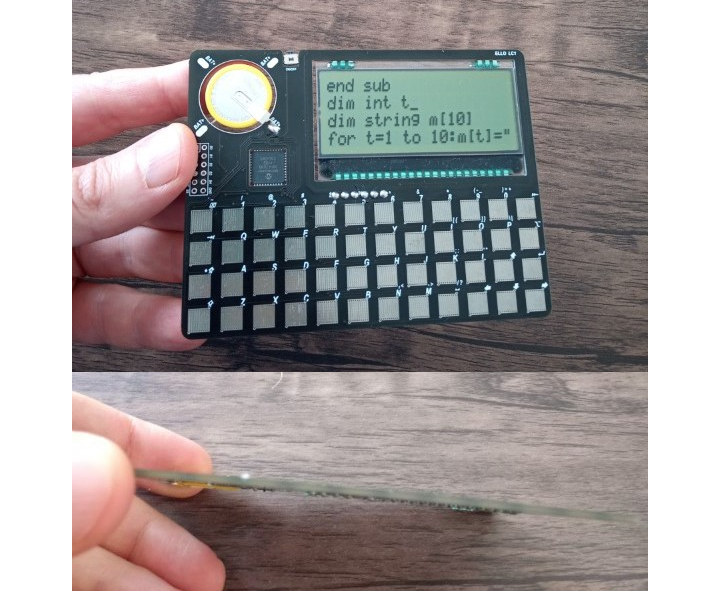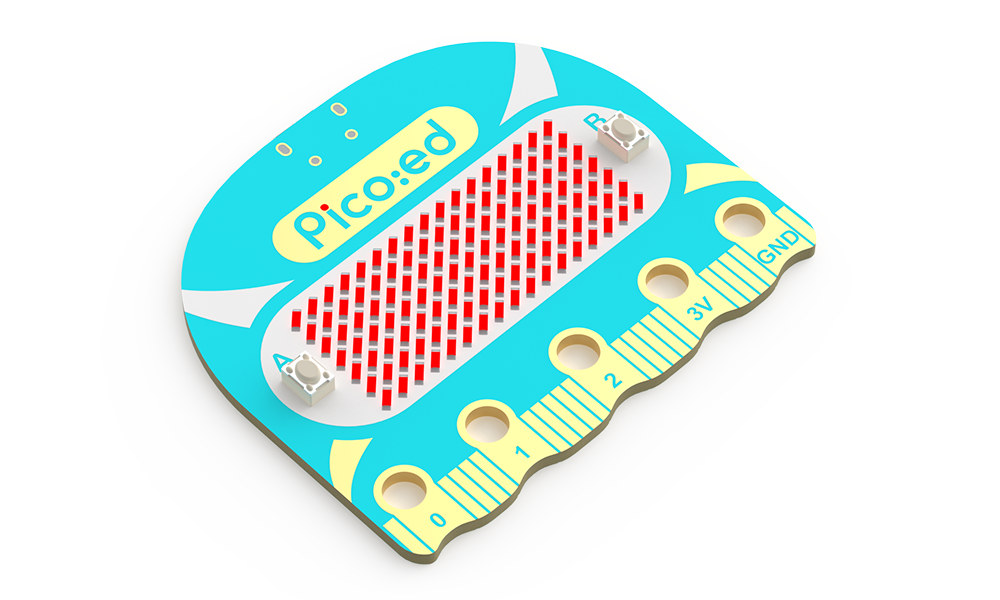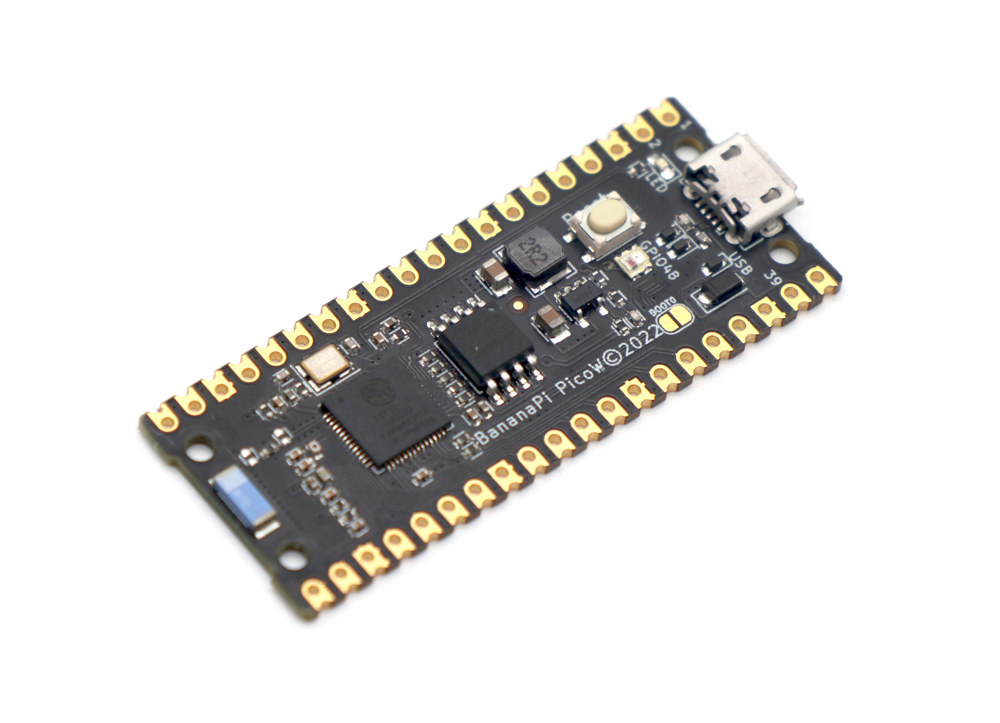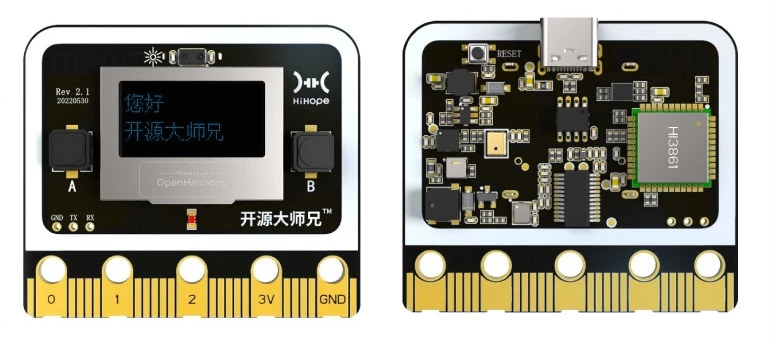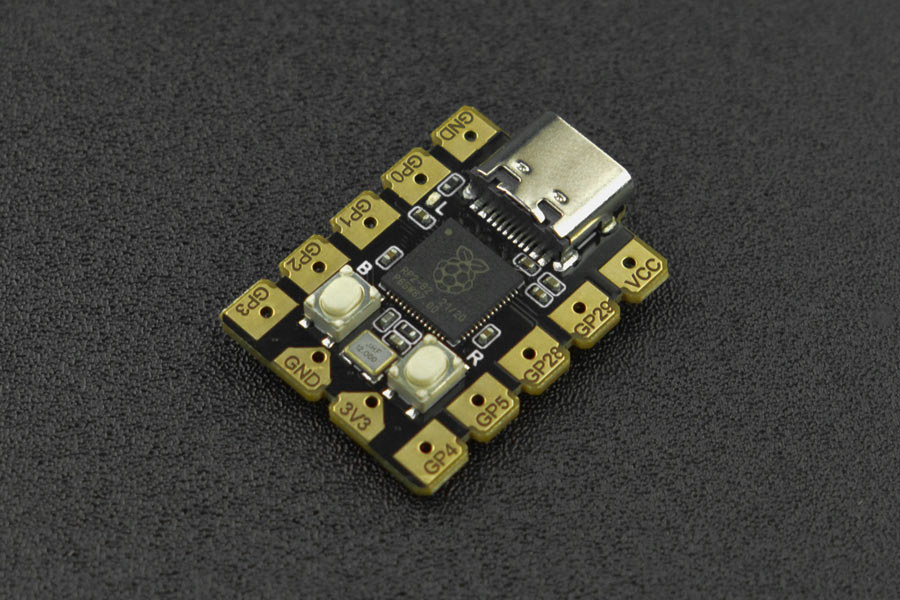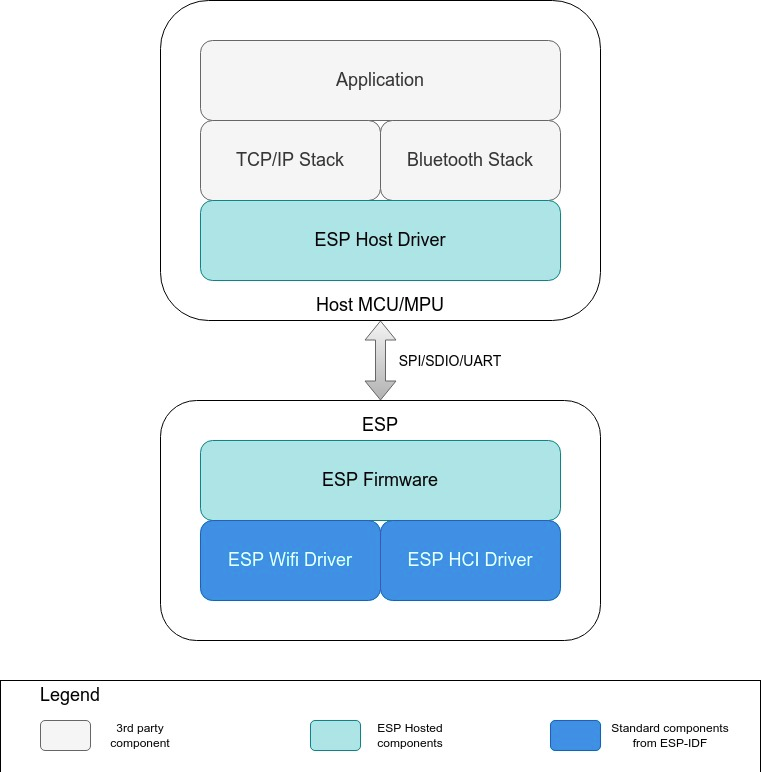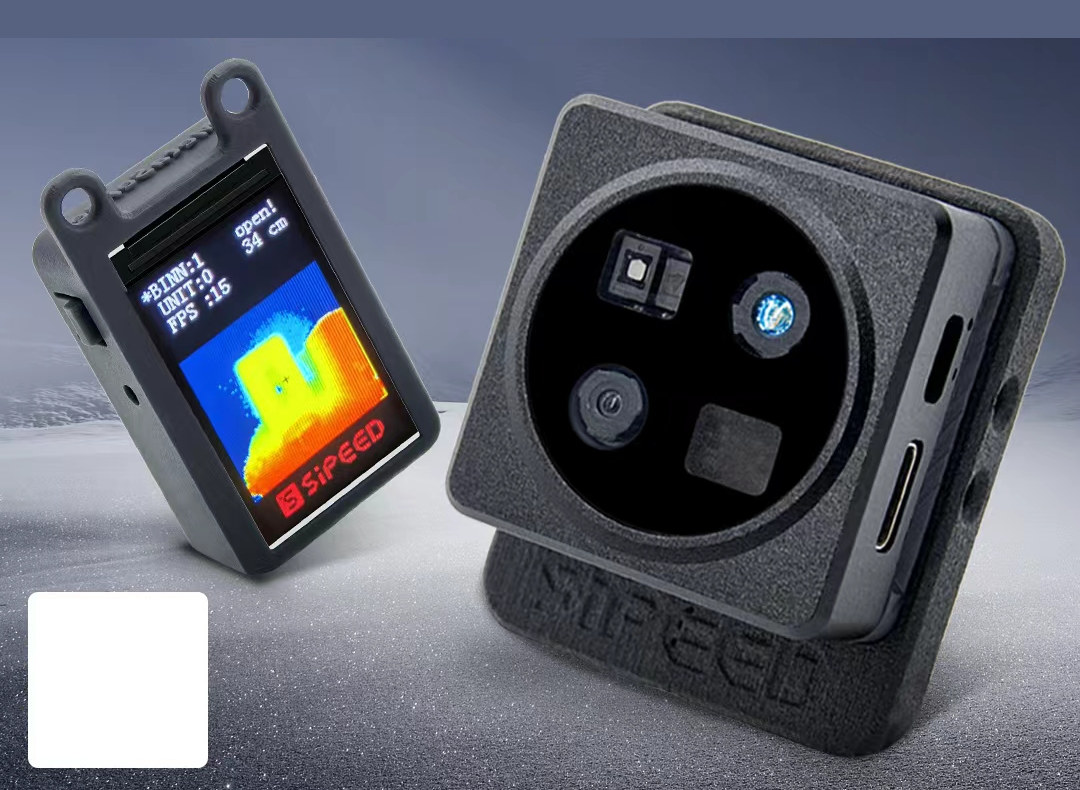We often write about business card or credit card-sized boards, but it’s only true for 2D dimensions, as most boards are over a centimeter thick, with possibly the thinnest we’ve covered being the Khadas Edge2 SBC that’s just 7mm thick. So Kn/vD took it upon himself to build a DIY computer that was really about the size of a credit card, and came up with the ELLO LC1 based on a Microchip PIC18 8-bit microcontroller, featuring an integrated display and keyboard, and powered by a coin-cell battery. It’s just 2mm thin. ELLO LC1 specifications: MCU – Microchip PIC18 (PIC18F47Q83-I/PT) 8-bit microcontroller with 13KB RAM and 128KB flash, out of which 64KB are reserved as user file storage Display – 20×4 character text panel (Display Visions EADOGM204N) Keyboard – 48x touch panels on the PCB Expansion – 12-pin unpopulated header for debugging (ICSP) and GPIO expansion Misc – Power button Power […]
Raspberry Pi RP2040 gets into BBC Micro:bit lookalike board
ELECFREAKS Pico:ed V2 is a Raspberry Pi RP2040 board heavily inspired by the BBC Micro:bit with an edge connector exposing rings suitable for crocodile clips, a 17×7 LED matrix display, and designed for the classroom. We’ve seen several BBC Micro:bit clones – or rather adaptations – over the years with boards such as the SiFive Learn Inventor, Elecrow Mbits, and HiHope “Big Brother” board. The Pico:ed V2 adds to the list, and the main differences are that it is based on the Raspberry Pi RP2040 microcontroller instead, and does not come with wireless connectivity relying on a USB interface only. ELECFREAKS Pico:ed V2 specifications: MCU – Raspberry Pi RP2040 dual-core Cortex-M0+ microcontroller @ up to 133Mhz with 264kB of SRAM Storage – 2MB QSPI flash Display – 17×7 dot-matrix display USB – 1x micro USB 1.1 port for power, data, and programming I/Os 25-pin notched “Wavy” connector with up to […]
$5.5 Banana Pi BPI-PicoW-S3 ESP32-S3 board follows Raspberry Pi Pico W form factor
Banana Pi’s BPI-PicoW-S3 is a development board following the Raspberry Pi Pico W form factor, but based on Espressif System ESP32-S3 dual-core microcontroller offering both WiFi 4 and Bluetooth LE connectivity. The Raspberry Pi SBCs have inspired many designs, but the Raspberry Pi Pico MCU boards less so. So far, I had only seen the WeAct RP2040 board with the same layout except for a USB Type-C port and a 16MB flash. But the Banana Pi BPI-PicoW-S3 provides a direct alternative to the Raspberry Pi Pico W with a more powerful microcontroller, vector instructions for AI acceleration, BLE, and about the same price at $5.5 plus shipping. Let’s see how the BPI-PicoW-S3 specifications compare to the ones of the Raspberry Pi Pico W in the table below. While the power signal (5V, 3.3V, GND) and GPIO numbers are the same on both boards, there are a few variations here and […]
OpenHarmony development board borrows BBC Micro:bit edge connector
HopeRun’s HiHope development board features a HiSilicon Hi3861V100 32-bit RISC-V microcontroller compatible with OpenHarmony OS and looks very much like the BBC Micro:bit educational board notably with its edge connector. The board is also designed for youth education (in China) and comes with similar sensors, but there are some differences such as a 0.96-inch OLED instead of an LED matrix and support for offline voice recognition. There’s no wireless connectivity apart from NFC support. HiHope board specifications: MCU – HiSilicon Hi3861 32-bit microcontroller @ up to 160 MHz with 352 KB SRAM and 288 KB ROM, 2 MB flash memory Display – 0.96-inch OLED display with 128×64 resolution (SSD1306) Connectivity – NFC with R/W mode, card emulation, and bidirectional mode USB – 1x USB Type-C port for power and programming Sensors – Temperature & humidity sensor, light sensor, microphone, 6-axis motion sensor Expansion – Edge connector with 5x rings (3x […]
Beetle RP2040 is a tiny Raspberry Pi RP2040 board with easily solderable pads
DFRobot Beetle RP2040 joins other miniature Raspberry Pi RP2040 developments boards such as Pimoroni Tiny 2040 & Adafruit QT Py RP2040, but with only eight GPIOs accessible through larger pads that are easier to solder. The tiny 27 x 20 mm board comes with a USB Type-C port, BOOT and reset buttons, and twelves pads with a through hole each comprised of eight GPIOs, plus VCC, 3.3V, and GNS pads. The Beetle RP2040 is designed to be embedded into small devices or projects, and the company selected I/Os that can be configured as I2C, UART, SPI, GPIOs, analog input, etc… Beetle RP2040 specifications: MCU – Raspberry Pi RP2040 dual-core Cortex-M0+ microcontroller@ up to 133Mhz with 264kB of SRAM Storage – 2MB QSPI flash USB – USB 1.1 Type-C port for power, data, and programming I/Os 12x golden pads with through hole for 8x I/Os pins enabling up to 2x I2C, […]
Silicon Labs FG25 Arm Cortex-M33 SoC targets Wi-SUN FAN networks
Silicon Labs announced various new products at its annual Works With Developer Conference including the FG25 Arm Cortex-M33 SoC designed for sub-GHz Wi-SUN FAN networks for Smart Cities and applications such as smart metering, street lighting, electricity distribution automation, municipal infrastructure, and more. The microcontroller runs at up to 97.5 MHz, features 512KB RAM and up to 1920 KB flash, operates at up to 125°C, consumes as little as 2.6 μA in deep sleep mode, and can offer a range of up to 3 km when used in combination with the new EFF01x front-end module delivering up to +30 dBm output power. Silicon Labs FG25 (EFR32FG25) specifications: CPU core – Arm Cortex-M33 core @ 97.5 MHz with DSP instruction and floating-point unit for signal processing Memory – Up to 512 kB RAM data memory Storage – Up to 1920 kB flash program memory Radio Sub-GHz radio operation TX power up […]
ESP-Hosted simplifies adding WiFi connectivity to legacy Linux or MCU-based products
Most of the ESP8266 and ESP32 projects and products we cover here use the Espressif microcontroller as the main chip, but ESP8266 started as a WiFi module meant to be controlled with AT commands from a host device. But there are still “legacy” products that may benefit from connecting to the cloud, and Espressif introduced the ESP-Hosted for that purpose in 2020, and recently released a next-generation ESP-Hosted solution (ESP-Hosted-NG) specifically for Linux hosts. The solution is available in two variants: ESP-Hosted-FG (First generation) exposing an Ethernet interface to the host and suitable for microcontrollers and Linux hosts, and the ESP-Hosted-NG presenting an 802.11 network interface and designed for Linux hosts only. Both solutions include ESP32 firmware and a host driver running on the legacy system. Espressif Systems recommends using ESP-Hosted-FG on an MCU host, and ESP-Hosted-NG on a Linux host in order to benefit from Linux user space applications/services […]
Sipeed MetaSense RGB ToF 3D depth cameras are made for MCUs & ROS Robots (Crowfunding)
We’ve just written about the Arducam ToF camera to add depth sensing to Raspberry Pi, but there are now more choices, as Sipeed has just introduced its MetaSense ToF (Time-of-Flight) camera family for microcontrollers and robots running ROS with two models offering different sets of features and capabilities. The MetaSense A075V USB camera offers 320×240 depth resolution plus an extra RGB sensor, an IMU unit, and a CPU with built-in NPU that makes it ideal for ROS 1/2 robots, while the lower-end MetaSense A010 ToF camera offers up to 100×100 resolution, integrates a 1.14-inch LCD display to visualize depth data in real-time and can be connected to a microcontroller host, or even a Raspberry Pi, through UART or USB. MetaSense A075V specifications: SoC – Unnamed quad-core Arm Cortex-A7 processor @ 1.5 GHz with 0.4 TOPS NPU System Memory – 128 MB RAM Storage – 128MB flash Cameras 800×600 @ 30 […]


